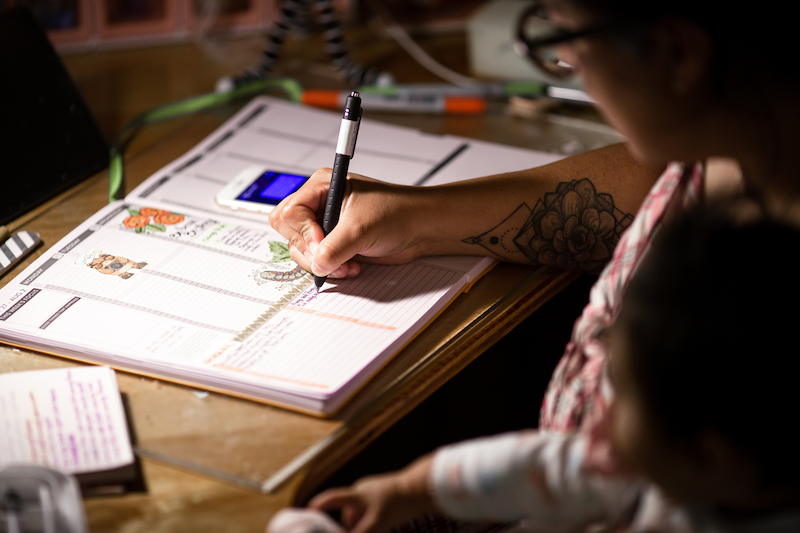The data tells us that marriage gets harder after children. There are more demands on our time and our resources, and we are often more tired. There is a need to talk about how the household operates and to think carefully about how to split the extra work.
Often, though, that doesn’t happen. And a common result of this situation, and the lack of discussion, is that tasks are not split equally. On average, in heterosexual couples, women are doing more. And they often resent it, especially when a lot of the “more” is in parts of tasks that seem invisible. Most household tasks require more than just doing — they require planning. If one person is doing all the planning, things can get unequal very quickly, even if you’ve evenly split the doing.
How to fix this?
One of the ideas I talk about in The Family Firm is total responsibility transfer, or what we call in our house “TRT.” This idea owes its origin, for me, to Thomas Phelan’s excellent book The Manager Mom Epidemic, and there is a great discussion of it in Eve Rodsky’s Fair Play (she calls it “CPE,” for conception-planning-execution). But I think it lives well on its own, even apart from the overall systems that all of these books suggest (and which are all helpful!). At its core, the aim of TRT is to address some of the all-too-common inequities in parental work.

The problem with invisible work
Many tasks and responsibilities in our households have two parts. There is a planning part, and there is an execution part. For example: children’s doctor’s appointments. There is the making of the appointment, and there is the taking to the appointment, and both of them are work. One part of this work is easy to see — it’s the taking to — while the other part, the making of the appointment, is “invisible work.” Invisible work is invisible but often not small.
This is most vividly illustrated, I think, in meal planning. Making meals for a family requires planning, shopping, and cooking. Doing only the cooking or only the shopping and cooking is only part of the work. Figuring out meal plans is an enormous pain! I have hope for AI, but I have yet to find one that will do exactly what I want: ask me questions about my week, build a menu and shopping list, and fully meal plan. Right now, I do this, and I hate it. For me, it’s far worse than the actual cooking, which is fine.
If you cook dinner for the family but do not plan it, that’s awesome, but it is not the same as having done the entire task.
How to TRT
Total responsibility transfer refers to the concept that if someone is going to take over a task, they must take over all the parts of it. When we think about allocating tasks across family members, we must think about the whole task.
For me, though, TRT is broader than task allocation. It’s become a shorthand that my family uses when we put someone in charge of something, usually something they do not normally do. This week, for example, I’ll be gone on Tuesday night for a work thing, so I TRT-ed bedtime to Jesse, a task that I normally do. If I have to leave early in the morning, I sometimes TRT getting out the door for school to my older child.
The idea behind the shorthand is to hand over the responsibility. I’m leaving early, and I’m handing you the full responsibility of getting out of the house on time and to school. I’m not handing you a single thing to do — say, pack a backpack. It’s the whole shebang, all together, and you implement it.
When people hear about this, it sounds great in principle. “I would love to just pass off the job of dinner to my spouse” is something I hear very frequently. The implication is that the barrier is that the other person isn’t willing to accept it. This is obviously sometimes (perhaps often) true.
However — and I say this with the full knowledge that I am guilty of it myself — sometimes the barrier to a good TRT is the person who is doing the transferring because a fully successful TRT requires giving up control over the activity.
Let’s say you TRT one dinner a week to your partner. And let’s imagine that every time, she makes pasta with jarred sauce — every time. So you start weighing in: let’s add sausage! How about pesto? Pasta again?! As you make suggestions, you have failed to TRT. Did you want to think about the meal or not? If you did want to think about it, why did you try to TRT it? If you didn’t, you’ve now failed.
My mother was the absolute champion at the dinner TRT. For my entire childhood, she insisted my father plan and execute three of the six at-home meals a week. My father (Dad, I love you!) was not as good a cook as my mom. He could make basically four things: sesame chicken, quiche, hamburgers and fries, and — I am not making this up — veal piccata with rice and peas. We had those all the time. And my siblings and I complained! We did! Constantly! But Mom was a complete rock. Whether it was a commitment to feminism, a desire not to meal-plan, or a love of veal piccata, I will never know. But it was a true TRT.
The problem with a partial TRT
The problem with not fully handing over the task (a partial TRT) is twofold. It does not accomplish the main goal of taking the thinking off the plate of the person who transfers. And in many cases, it can feel disrespectful to the person who got the task. Implying that your partner is bad at something, even fairly indirectly, isn’t a great recipe for success.
An obvious follow-up question is along the lines of: What if I TRT dinner and my partner just serves cereal every time, and I think kids need to eat vegetables? Or what if I TRT bedtime to the grandparents, and they let my kids stay up until midnight watching television?
This isn’t a reason not to TRT; it’s an argument for establishing some of your family’s most important boundaries in advance. Maybe you want basic rules about what constitutes a meal (things like: must contain a protein and a vegetable). You probably want a set bedtime (sleep is important). By establishing these together, it makes it easier to TRT because you know that whatever your fundamental things are will get implemented.
Total responsibility transfer is not going to fix the problem of invisible labor. Sorry! But for me at least, it’s been important in thinking about both what it means to give someone else a task and what I need to give up to do that. As much as I hate meal planning, I’m not willing to TRT it within my household (although, again, I’m waiting on that AI), and recognizing that actually makes me less resentful about doing it.
When I do choose to TRT something, I think I’m better at staying out of it. Just don’t ask my family about that.
The bottom line
- Total responsibility transfer (TRT) refers to the concept that if someone is going to take over a task, they must take over all the parts of it — the planning and execution.
- A fully successful TRT requires the person who is typically in charge of a particular task to give up complete control over the activity. This can be challenging, but it is essential.
- You can make this easier by together establishing some of your family’s most important boundaries in advance.




















Log in
We use a version of TRT in my household, where my wife works and earns money, and I’m the “housewife” (meaning it is my job to either do everything else, or at least ensure it gets done). It has worked out well, even if my wife still ends up having to do some things, since I’m a man with lower standards for what constitutes “good enough” compared with her. We often talk about how important a “division of labor” is.
Anyway — on a different topic: forget your AI meal planning pipe dream. It’s much MUCH easier (and ultimately less stressful) to do away with meal planning altogether. You need to 1) make sure you have a very well-stocked larder with all manner of dry and canned goods (a decent app, or even dry erase board, will help you keep track of re-supplying during monthly, or every-two-months “stock up” grocery trips); 2) have a good chest freezer with ready-to-thaw proteins in usable portions (for me that’s steaks, chicken thighs, pork chops, and all sorts of different ground meats, which you also keep well stocked on those monthly grocery trips) — throw something in the sink as you leave the house in the morning and it’ll be thawed and ready to cook for dinner; and 3) lots of high-quality, minimally-processed seasonings/flavorings/additions like soy sauce, oyster sauce, simmer sauces, pasta sauces, Mexican sauces, miso, cheese, olives, capers, etc. etc. Then, every week, just go shopping for fresh stuff and buy whatever looks best and/or is on sale. With high-quality ingredients, recipes don’t really matter very much. You can go a LONG way on “sauté some ground meat with onions and garlic, add XXXXX for flavor (like my go-tos — Herdez brand Roasted Chile Verde Salsa and Mezzetta Marinara, which have exactly the same ingredients as I’d use if I made it at home, and taste almost as good), throw in some random fresh veggies (or serve on the side), top with whatever sounds interesting, and serve over/with some starch. Easy. Delicious. Healthy. Literally comes together in the time it takes to make pasta or rice or potatoes, and often requires nothing more than salt and pepper in terms of seasoning. (With the marinara, since it’s really just plain tomato sauce, you can do all kinds of things with it, like whip up a quick chana masala with ginger, toasted cumin seeds, and cilantro.)
Save the recipes and ingredients lists for special occasions. 🙂
Your thaw in the sink strategy is, while common and obviously working for you, not considered safe handling of food (time temperature abuse is generally considered 4 hours of any portion of the food (so the outside of the protein in this case) in the temperature danger zone which is anything above refrigeration and below cooking). Your approach would also be challenging for us urban dwellers with less space for pantries and chest freezers which has made implementing a similar strategy difficult for me in the past, but I’d like to be able to apply a similar approach in my life!
Thank you for introducing me to the concept of TRT. I manage a team of engineers, and I have shared this concept with many of them–it’s really helpful in a professional context as well, and so much healthier!!!